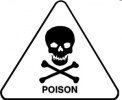
Serenity is not freedom from the storm, but peace amid the storm.
Do you have any toxic habits?
No, I’m not thinking of Oreos or ice cream—despite my doctor’s warnings, those are clearly proof that God loves us and wants us to be happy.
I’m thinking more about thoughts, beliefs, or habits of thinking that limit our ability to live full, free lives.
There’s a lot in life that we can’t control, but we’re always masters of our own attitudes. We’re always free to choose toxic thoughts that poison our minds with self-defeating attitudes.
You might ask why anyone would make that sort of choice. I’m not really sure; I just know that I do it much too often.
Here’s my list of five toxic thoughts, along with their respective antidotes. See if any of them ring a bell for you, and perhaps you can leave a comment with some other ideas.
#1: Believe that life is supposed to be pain-free.
This is a good one, because it provides a double dose of mental poison.
First, you’ll automatically interpret any struggle or difficulty as proof that something’s wrong. So rather than seeing the opportunity within a challenge, you’ll only perceive the obstacle.
Second, you’ll stop trying at the first sign of any obstacle. You’ll do anything to remove or avoid any discomfort, so you’ll never develop the discipline required to overcome obstacles.
Antidote: Realize that very little of value comes without a certain amount of effort and discipline. Diets and exercise programs require sacrifice; same principle applies to anything worthwhile. Develop the self-discipline required to see the opportunity as well as the challenge.
#2: Believe that things are always supposed to happen according to expectations.
Internet connection goes down? Weather forces a cancelation? Uh-oh, life’s out to get me again.
The real power here lies in preventing any recognition of blessing in unexpected developments. So instead of enjoying a few hours without email or a snow day at home, I fuss and struggle and worry about issues I can’t control anyway.
Antidote: Accept that stuff happens. Go with it a bit, especially when there’s nothing you can do to change things. Find the joy in an unanticipated event. Remember that life is what happens while you’re planning what’s supposed to happen.
This isn’t the same as floating aimlessly through life. It’s good to set goals and make plans, but there’s something healthy about recognizing that some things are simply beyond your control.
#3: Believe that you’re a victim.
Whenever anything goes wrong, immediately conclude that it’s hopeless. Never look for what you can control, especially your own attitudes and beliefs. Always see yourself as a helpless pawn pushed around by outside forces and events. Never take responsibility for your role in the way things happened.
Antidote: Strike a healthy balance between acceptance and control. Remember The Serenity Prayer:
God grant me the serenity
to accept the things I cannot change;
courage to change the things I can;
and wisdom to know the difference.
#4: Believe that everyone should like and approve of you.
Consider any criticism, regardless of merit, as a personal failure. Fuss and fret endlessly whenever someone disagrees with you.
Antidote: Listen to others’ ideas and opinions, but make your own judgments. Understand that everyone, including you, has biases and blind spots. Cultivate close, trusting relationships with a few people to whom you can turn when you’re uncertain.
#5: The most deadly poison
I see too much of myself reflected in these toxic thoughts, but they’re mild irritants compared to the last one: Believe you’re supposed to be perfect.
Never give yourself a break. Make any mistake an occasion for endless recrimination and second-guessing. Engage in “If only …” and “wouldda-shouldda” until you are totally beaten down. Never complete any project until every possible contingency has been carefully studied, then be overly critical of your inability to meet deadlines.
Re-write the language so “anything less than absolute perfection” becomes “I’ll never be any good at anything.”
Antidote: Do your best, acknowledge your flaws, capitalize on your strengths, and move on.
Looking back at my list, I notice another important pattern. The antidote for a toxic thought is not the opposite extreme. For example, the solution to perfectionism isn’t a lack of concern for quality.
The keys are balance and discernment, the line from The Serenity Prayer that seeks “… the wisdom to know the difference.” And that, of course, is the hard part.
There’s no recipe for wisdom, no five-step plan for discernment. Balance is a continual, life-long quest.
So, what are your thoughts? Do you see yourself in any of my poisonous habits? What other toxic beliefs do you encounter?
